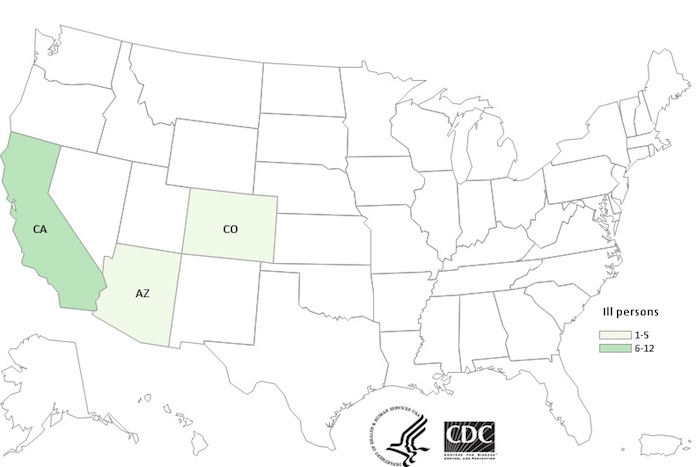The Salmonella Anatum outbreak linked to imported Maradol papayas has been updated by the CDC. There are four separate outbreaks linked to that fruit. The case count in this outbreak is 14 people sickened in 3 states. Five people have been hospitalized, and one person in California has died.

The DC is also investigating six other ill persons whose isolates match the isolates in this outbreak. They are trying to determine if these “more recent illnesses” are also linked to the Bravo Produce Maradol papayas.
The case count by state is: Arizona (1), California (12), and Colorado (1). Illnesses began on on dates ranging from December 20, 2016 to April 8, 2017. The ill persons were discovered from data stored on PulseNet, but government officials did not know the source of the pathogenic bacteria until recently. Even though the last illness was reported last spring, this outbreak may not be over.
The median age of ill persons is less than 1 year to 85. Ninety-two percent of patients are female. Among 11 people interviewed, 10, or 91%, are Hispanic.
On September 4, 2017, FDA testing of imported papayas at the U.S. – Mexican border uncovered the outbreak strain. Epidemiologic, laboratory, and traceback evidence indicates that Maradol papayas imported by Bravo Produce Inc. of San Ysidro, California, packed by Frutas Selectas de Tijuana, S. de RL de CV, from the grower Productores y Exportadores de Carica Papaya de Tecomán y Costa Alegre in Tijuana, Mexico are the source of this outbreak.
Whole genome sequencing showed that the isolate from the papaya and isolates from the 14 cases identified so far were closely related. And Bravo Produce was a supplier of Maradol papayas to the grocery store chain (unnamed) where four of seven ill persons bought papayas.
Bravo Produce recalled the papayas from the same grower and packer on September 10, 2017. They were distributed in California from August 10 to August 29, 2017 and can be identified by the label on the fruit, marked Frutas Selectas de Tijuana.
If you have eaten these papayas and have experienced the symptoms of Salmonella food poisoning, which include nausea, abdominal cramps, diarrhea, vomiting, and fever, see your doctor. Even if you recover fully, the long term complications of a Salmonella infection can include reactive arthritis, high blood pressure, and irritable bowel syndrome. Your doctor should have a record of this illness on your medical chart.
The law firm of Pritzker Hageman helps people sickened by contaminated food such as these imported papayas protect their legal rights, and get compensation and justice. Our lawyers represent patients and the families of children sickened with bacterial infections in personal injury and wrongful death lawsuits against growers, packers, distributors, retailers, food producers, food processors, restaurants, schools, and others. Attorney Fred Pritzker recently won $7.5 million for young client whose kidneys failed because of hemolytic uremic syndrome after an E. coli infection. Class action lawsuits are usually not appropriate for outbreak victims because the cases are very unique.




